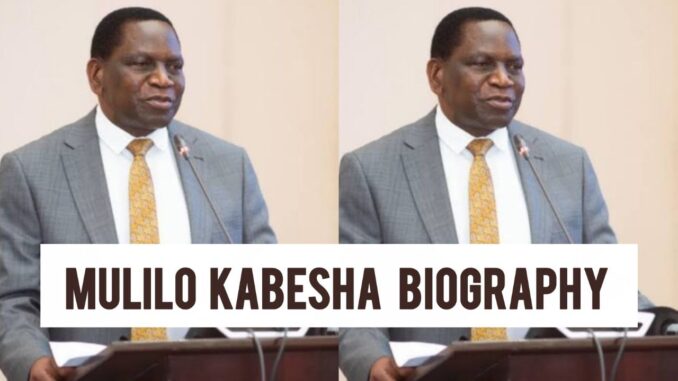
Mulilo Kabesha Biography
Mulilo Dimas Kabesha was born on February 4, 1962, in Lusaka, Zambia. In his youth he did work that might surprise people who now know him as a top government lawyer. He worked as a DJ and took part in music and media activities that helped him become comfortable speaking in public. He also served in ministry work and was active in church life. Mulilo Kabesha is 63 years old as of 2025.
Kabesha trained as a lawyer and later moved into public law. His progress from a youthful life on radio and in church to law and government gave him a voice that is direct and plain. He speaks to ordinary people in ways that many lawyers do not. This combination of skills made him a public figure who is both a courtroom advocate and a communicator for the state.
The story of Mulilo Kabesha is not only about legal briefs and courtrooms. It is also about a career shaped by different worlds: music booths, the pulpit, and the judiciary. That mix has influenced how he presents legal matters to the public and how he defends government positions in highly visible cases.
Mulilo Kabesha Career
Mulilo Kabesha’s professional life centers on public law and state legal work. He serves as the Attorney-General of the Republic of Zambia, the top legal adviser to the government. In this role he gives legal advice to ministers and to the president on matters of public law. The Attorney-General also represents the state in major court actions and leads the government’s legal team in national and international litigation.
As Attorney-General, Kabesha has appeared in many high-profile matters. He led the government’s legal effort in the cross-border case over the remains and burial of former President Edgar Lungu. That matter reached the Pretoria High Court in South Africa and drew wide media attention across the region. The government argued that Lungu, as a former head of state, should be given a state funeral and buried in Zambia. The Pretoria court agreed and ordered the repatriation of Lungu’s body for a state funeral. During this legal fight Kabesha was the visible face of the state. He filed court papers, spoke to journalists, and gave official briefings. His voice and statements were frequently shared on television and social media.
Legal directories and government profiles list Kabesha among Zambia’s leading state legal officers. He handles courtroom advocacy, legal research and drafting, and public legal communications. His work often involves constitutional questions, state protocol, and litigation where the government’s interests are at stake. Many of his public appearances mix legal detail with plain language so the public can more easily follow complex matters.
Beyond the courtroom, Kabesha uses media tools to explain legal choices and to brief the nation. Short video clips and live statements have become a regular part of how the Attorney-General’s office updates the public. This practice reflects his comfort with media and the public stage—skills he developed long before becoming Attorney-General.
Mulilo Kabesha Personal Life
Much of what is known about Mulilo Kabesha in public sources focuses on his work and public life. Official biographies and news reports emphasize his legal skill, his role in government, and his earlier years in ministry and media. They do not provide detailed information about family, marital status, or extended relatives. That part of his life remains mainly private.
People who have written feature pieces about him describe a man shaped by faith and community service. His time in ministry and his pastoral activities are often mentioned as formative experiences. Those roles taught him to listen, teach, and speak plainly to groups. They also helped him build trust among community members. This background in faith-based work is one reason he speaks in straightforward ways and focuses on values as well as law.
Kabesha’s social media presence and public briefings show he values clear communication. Video messages and short statements are common tools he uses to reach different audiences. These messages are widely shared on platforms like YouTube and Facebook and are often reposted by political pages and news outlets. While these channels show his public face, they do not reveal much about private family life.
In sum, Mulilo Kabesha’s public profile highlights a career and a public personality more than private details. He appears as someone whose life story—DJing, ministry, law—built a path to public service and a public voice.
Mulilo Kabesha Controversies
Mulilo Kabesha’s role as Attorney-General places him at the center of difficult and sometimes divisive legal battles. The most prominent recent controversy is the legal dispute over the burial of former President Edgar Lungu, which occurred in mid-2025. The matter brought intense public debate, political tension, and court action across borders.
When Edgar Lungu died while receiving medical treatment in South Africa, a dispute emerged between his family and the Zambian government. The family wanted a private burial in South Africa and said Lungu had asked that the current President, Hakainde Hichilema, not attend or be involved. The government argued that a former head of state is a person of national importance and that a state funeral and burial in Zambia are matters of public interest and protocol. Zambia’s Attorney-General’s office, with Kabesha as a visible legal lead, took the case to the Pretoria High Court to seek legal orders to repatriate the remains.
The Pretoria court ruled in favor of the Zambian government and ordered that the body be returned to Zambia for a state funeral. The court said that the public interest and protocol for a person of national importance can override private wishes about burial, even where a president had expressed a different desire. Judge President Aubrey Ledwaba emphasized that state protocol and national interest must be protected. In court and in statements that followed, Kabesha welcomed the ruling and said the government hoped the judgment would end the dispute, though he noted the family retained rights to appeal.
The case highlighted several tensions. It involved questions of law, national pride, and family grief. It also drew political lines because Lungu and his successor President Hichilema were known political rivals. The legal move by the government was seen by some as a matter of national protocol and by others as a political intervention into a private family matter. Kabesha’s central role meant he faced both praise and criticism in public discourse. Supporters said he defended national protocol and the dignity of an office. Critics argued the government should have handled the matter more sensitively or allowed family wishes to prevail.
Public communications around the case also sparked debate. The Attorney-General’s video briefings and media updates were widely shared. Those clips helped the government explain its legal position, yet they also became focal points for political commentary across social media and local news outlets. In polarized environments, legal statements can quickly become political messages, and Kabesha’s media appearances were no exception.
Beyond the Lungu burial dispute, the Attorney-General’s role often draws scrutiny because legal advice to the state touches on sensitive policies, prosecutions, and national decisions. When a government acts in contested ways, the legal officers who advise and represent it will always be part of controversy. Kabesha’s public style—plain and direct—means he is both visible and open to public challenge in ways that quieter legal officers might avoid.
Conclusion
Mulilo Kabesha’s career centers on public law and on representing the state in major legal matters. The recent Edgar Lungu repatriation case made him a visible legal voice across southern Africa. While much of his private life remains away from public records, his public role is clear: a lawyer who speaks plainly, defends state positions in court, and uses modern media to explain complex legal issues. Like many public legal officers, his work attracts both praise and controversy.
FAQs
Who is Mulilo Kabesha and what is his current role?
Mulilo Dimas Kabesha is a Zambian lawyer who serves as the Attorney-General of the Republic of Zambia. As Attorney-General he is the main legal adviser to the government and represents the state in important legal cases.
What is the Mulilo Kabesha biography and early life story?
Mulilo Kabesha was born on February 4, 1962, in Lusaka. His early life included work as a DJ and ministry service, experiences that helped him develop public speaking skills before he became a lawyer and a senior state legal officer.
What was Mulilo Kabesha’s involvement in the Edgar Lungu repatriation case?
As Attorney-General Kabesha led parts of the government’s legal effort in the Pretoria High Court to repatriate former President Edgar Lungu’s body to Zambia for a state funeral. The court ruled in favor of Zambia’s government and ordered repatriation.
How does Mulilo Kabesha communicate with the public?
Kabesha uses video briefings, press statements, and social media clips to explain legal positions. His background in media and ministry helps him speak in a clear, direct style that reaches wide audiences on platforms like YouTube and Facebook.

Ben Simon is a real estate journalist, consultant, and sports analyst who holds a BSc and an MSc in civil engineering. For 12 years he has focused on housing and property markets, writing clear reports, advising clients on development and investment, and using his engineering background to analyze building projects and market data. His combined skills help readers and clients understand property trends and make smarter decisions.
Leave a Reply